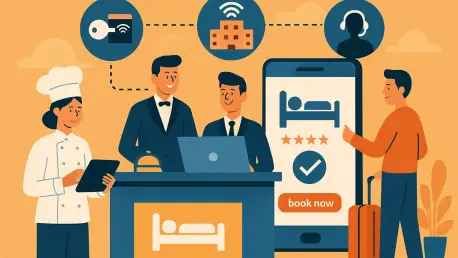Diving into the world of hospitality technology, I’m thrilled to sit down with Katarina Railko, a seasoned expert in travel and tourism with a deep passion for innovation in entertainment and events. With her extensive experience and keen insights, Katarina is the perfect guide to help us explore the latest advancements shaping the industry. Today, we’re focusing on a groundbreaking solution that’s transforming how hotels operate and enhance guest experiences. Our conversation touches on the challenges facing the hospitality sector, the push for digital transformation, and how cutting-edge tools are streamlining operations while prioritizing personalized guest interactions.
How did you first become interested in the intersection of technology and hospitality, and what excites you most about the innovations happening today?
I’ve always been fascinated by how technology can elevate experiences, especially in hospitality where every interaction counts. My journey started in travel and tourism, where I saw firsthand the pain points—inefficient systems, frustrated staff, and guests craving more personal touches. What excites me now is seeing solutions that not only solve these issues but also anticipate needs before they arise. The ability to blend seamless communication with personalized service through tech is a game-changer, and I’m thrilled to be part of this evolution.
What are some of the biggest hurdles the hospitality industry faces, particularly in regions like Asia Pacific, and how can technology help overcome them?
In Asia Pacific, the industry grapples with workforce shortages, a growing demand for hyper-personalized guest experiences, and outdated legacy systems that just can’t keep up. Technology steps in by automating repetitive tasks to ease staffing pressures, enabling tailored interactions through data-driven insights, and replacing clunky old systems with agile, integrated platforms. It’s about working smarter, not harder, and ensuring both staff and guests feel the benefits.
Can you explain how modern solutions are enhancing the guest experience compared to traditional setups in hotels?
Absolutely. Modern solutions prioritize seamless communication and convenience. Unlike traditional setups where guests might struggle to reach staff or get quick responses, new platforms make it effortless for guests to connect from their rooms for requests or information. Features like real-time updates and intuitive interfaces ensure interactions feel personal and immediate, turning a standard stay into a memorable experience.
What advantages do cloud-based platforms bring to hotel operations over older communication systems?
Cloud-based platforms are a breath of fresh air compared to older systems like traditional PBX. They’re scalable, so hotels can adapt as needs change without massive hardware overhauls. They also centralize communication, making it easier to manage everything from guest calls to staff coordination in one place. Plus, being cloud-hosted means updates and maintenance happen remotely, reducing downtime and IT headaches for the hotel.
How do these new tools streamline daily operations for hotel staff?
They simplify the chaos of daily tasks. Features like automated wake-up call management and room service coordination cut down on manual errors and save time. Real-time integration with room availability and guest needs means staff can respond instantly to requests or issues, whether it’s housekeeping or a special guest requirement. It’s all about keeping things running smoothly behind the scenes so staff can focus on what matters—connecting with guests.
In what ways do advanced hospitality solutions improve IT security for hotel teams?
Security is critical, especially with so much guest data at stake. Modern solutions often come with built-in safeguards like encrypted communications and secure cloud environments. They simplify IT management by reducing the number of disparate systems staff need to juggle, which lowers the risk of vulnerabilities. It’s about creating a safer digital space so teams can focus on hospitality without worrying about breaches.
How do these technologies free up staff to focus on meaningful guest interactions?
By automating mundane tasks like call routing or system updates, technology lets guest-facing staff step away from back-office grunt work. Instead, they can spend more time engaging with guests—whether it’s a warm welcome, a personalized recommendation, or solving a unique request. This shift boosts guest satisfaction and lets staff shine in roles where human connection makes all the difference.
What role do integrations with existing hotel systems play in making these solutions effective?
Integrations are the backbone of effectiveness. When a solution connects natively with Property Management Systems or Call Accounting Systems, it creates a unified workflow for staff—no more toggling between platforms or manual data entry. Support for API development also means hotels can link to other tools like CRM systems, extending communication between guests and staff. It’s about creating a cohesive ecosystem where everything talks to each other seamlessly.
What’s your forecast for the future of digital transformation in the hospitality industry?
I see digital transformation accelerating at an incredible pace. We’ll likely see even deeper integration of AI and IoT, where hotels predict guest needs before they even ask—think rooms adjusting temperature or lighting based on preferences. The focus will remain on balancing tech with the human touch, ensuring guests feel cared for, not just processed. I also expect a push toward sustainability, with tech optimizing energy use in hotels. It’s an exciting time, and I can’t wait to see how it unfolds.









